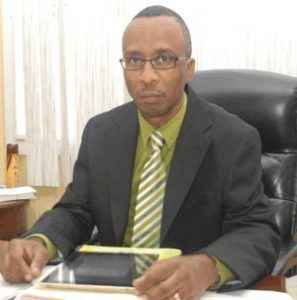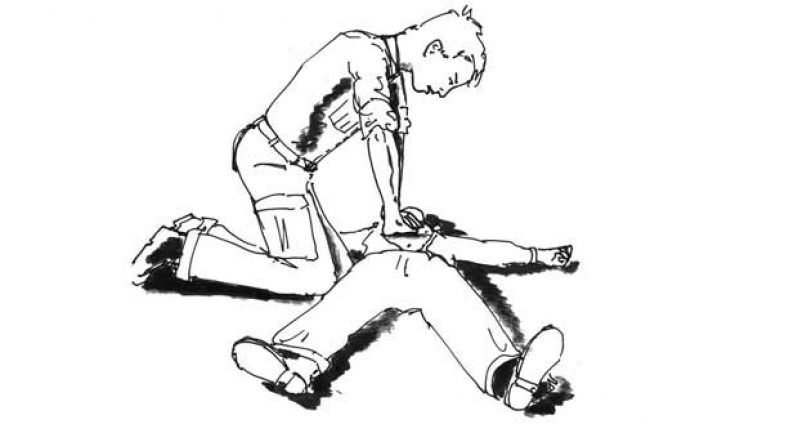‘WHEN the shots began that morning, he saw many people lying on the ground, including a young girl. Some were bleeding. Hernandez said he moved from person to person checking pulses. One man was already dead.

Then he saw Giffords. She had fallen and was lying contorted on the sidewalk. She was bleeding… Using his hand, Hernandez applied pressure to the entry wound on her forehead. He pulled her into his lap, holding her upright against him so she wouldn’t choke on her own blood… Hernandez used his hand to apply pressure until someone from inside Safeway brought him clean smocks from the meat department. He used them to apply pressure on the entrance wound.’
THE ABOVE account is an excerpt from an article posted on AZCentral.com, an Arizona-based news website, one of the dozens of state and national press entities covering the attempted assassination of US Congresswoman, Gabrielle Giffords, and concurrent shooting to death of six other people.
It details how the intern, Daniel Hernandez, used the First Aid knowledge he learnt in high school to essentially save the congresswoman’s life. While his heroic action is definitely commendable, the fact is, had he not possessed some very specific knowledge concerning what to do in the case of an emergency of that nature, the death toll would have been seven, inclusive of the outspoken Democratic politician.
This brings me to my topic for this week, as unscheduled as it is, and that is: How much First Aid does the average person know? As an extension: Is it enough to save a life? I would wager that most of us do not have the knowledge, however sharp our presence-of-mind might be, of appropriate First Aid beyond what we know from television, or perhaps a text, that is: The basic mechanisms for the Heimlich Maneuver and mouth-to-mouth resuscitation.
From my Online research in the wake of the stories about Hernandez’ heroic behaviour, there are various levels of First Aid; maybe as much as there are different organisations around the world, which provide certification. Basic First Aid training deals with arming people with the knowledge of simple things that could mean the difference between life and death: How to put pressure on a puncture wound, for example, in order to adequately stem bleeding, or how to position a person, depending on the type of fracture they might have sustained.
I know that in Guyana, the local branch of the International Red Cross is one organisation that has more or less regular First Aid Certification courses, with classes of varying sizes, but not averaging more than 20 persons a class. That said, I don’t imagine that the programme is qualifying a significant number of persons in First Aid, relative to the nation’s population, since the resources simply are not available. The question may be asked: Do we need to have a citizen’s army of certified CPR specialists?
My answer would be yes. This is, in my mind, one of those areas that results in greater public good should more access be had. Despite the massive strides our health care system has made over the past decade or thereabouts, I think few would argue that our capacity to adequately handle significant emergency cases at any one time is something that is still very much a work in progress. A solution, therefore, for both the short and the long-term, would be a state of affairs in which First Aid knowledge and experience are as widespread as possible among the general population. There is a saying that says: “A stitch in time saves nine.” Looking at how the simple actions of Hernandez saved Giffords’ life — consider if we were to extrapolate those actions to the dozens of trauma victims that engage the health care system on a weekly basis.
Imagine the average father instinctively knowing the correct thing to do in the event of a potentially fatal puncture wound in his son’s belly; the random passer-by attending to the old lady who faints by the roadside and is in danger of choking on her tongue; or assisting an epileptic who is experiencing a fit and is in danger of biting his or her tongue.
On a practical level, of course, First Aid certification is not something that a country such as Guyana can feasibly implement in any sort of universal mandatory way as, for example, the core subjects of Math and English. The trick in this case, therefore, is to develop a programme that strategically targets key areas of the population in order to maximize the potential impact of the core intent of the initiative, which should be making First Aid widely available.
In my view, there is no more crucial area — outside of the health sector, of course — than our public transportation. Immediately, the minibuses come to mind. Minibus drivers in the past have been extremely cooperative with various public campaigns, from HIV/AIDS reduction, to public health, to waste disposal. Even more important than good public spirit, however, is the nexus between minibus travel and road fatalities in Guyana. There is almost a moral imperative to ensure that minibus drivers and conductors have some basic First Aid training — an initiative that can be part of a general campaign to reduce road fatalities — in addition to those that focus on the reduction of dangerous driving and proper road usage. Granted there is always the question of availability of resources, training as well as the provision of First Aid kits on minibuses can be supported, at least in the initial stages, by some form of donor support.
First Aid in public transportation is, of course, not relegated to minibus travel alone, but extends also to travel in riverine communities, undertaken mostly by speedboat, and thus, ideally the programme should reflect this.
I am unsure whether First Aid is a part of police training, but I think we can make a safe bet that there is no ongoing programme in the Force with regard to this. I can see nothing but tremendous good coming out of a Guyana Police Force training regime which provides – if it does not exist – basic First Aid certification as part of the new recruit’s qualification requirements, in addition to remedial and advanced training for officers, particularly those out in the field.
I mentioned earlier that implementing a universal First Aid certification would be problematic, even within the education system, but that doesn’t mean it has to be completely out of the system. What was interesting with the Hernandez rescue is that he learnt much, if not all, of his First Aid skills in high school! While it may not be part of the official curriculum, support can be made for the development of First Aid clubs in the high school system; something that receives strong official support, with non-academic incentives for joining.
Finally, while we may not be able to have training and practice on a universal level, that also does not preclude wide dissemination of the theory in the form of basic tips, for example; this is where the mass media can play a crucial role. Perhaps in collaboration with the Red Cross, there can be an ongoing campaign — nothing too hyped up, over-the-top and unsustainable — which presents the simple, comprehensible presentation of pertinent First Aid information.
We are almost bombarded daily with stories of people meeting an untimely end, whether accidentally or by the sort of senseless violence that shook Arizona last week. With the promotion of the usefulness of First Aid knowledge and training, I believe that we can be able to demonstrate — as the story of Hernandez and Giffords illustrates — that hope can be salvaged from even the direst of situations.
By Keith Burrowes




.png)









